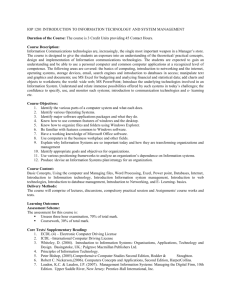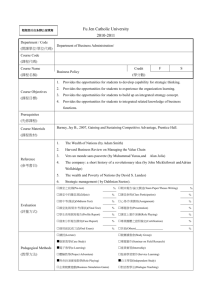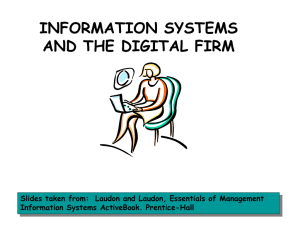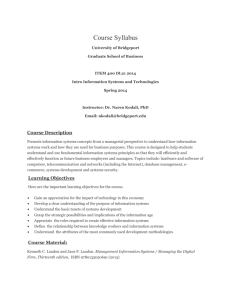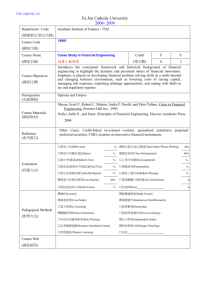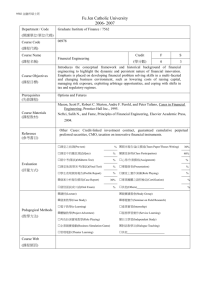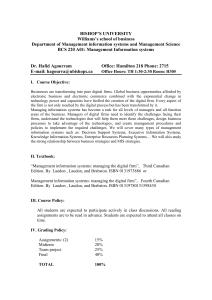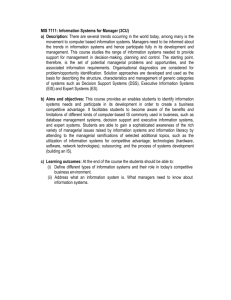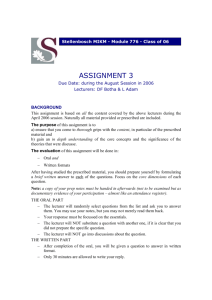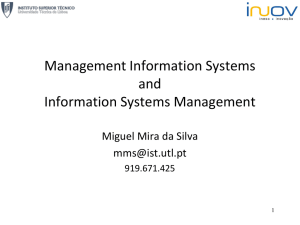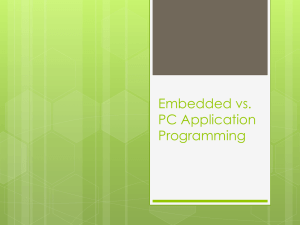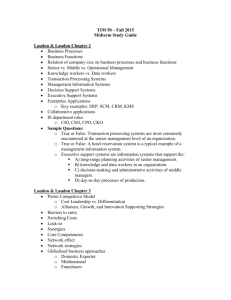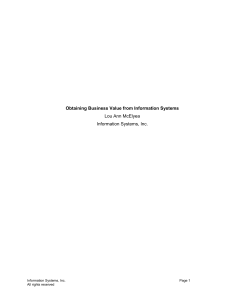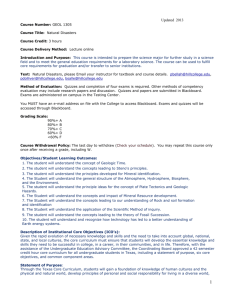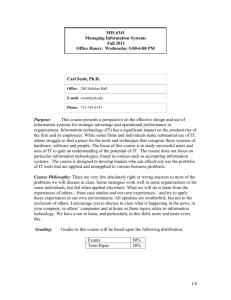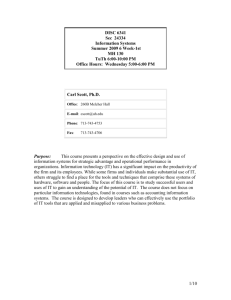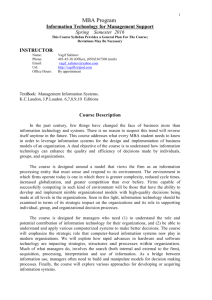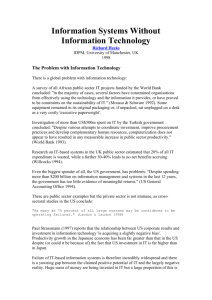Syllabus for 2003, Fu Jen Catholic University
advertisement
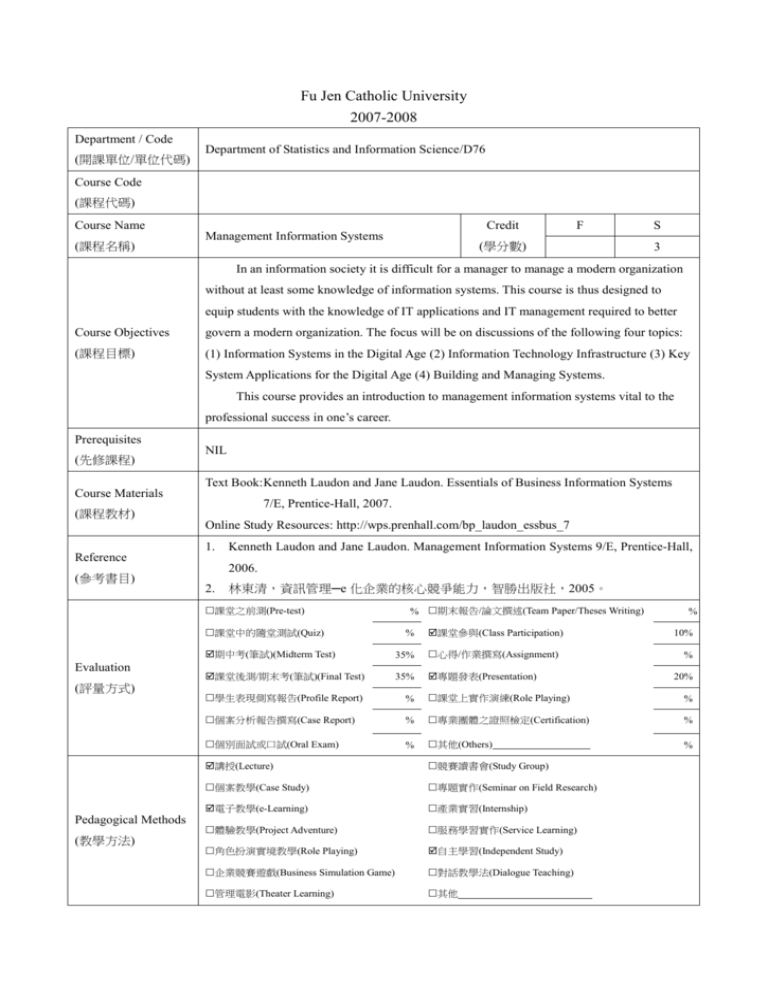
Fu Jen Catholic University 2007-2008 Department / Code (開課單位/單位代碼) Department of Statistics and Information Science/D76 Course Code (課程代碼) Course Name (課程名稱) Credit Management Information Systems F (學分數) S 3 In an information society it is difficult for a manager to manage a modern organization without at least some knowledge of information systems. This course is thus designed to equip students with the knowledge of IT applications and IT management required to better Course Objectives govern a modern organization. The focus will be on discussions of the following four topics: (課程目標) (1) Information Systems in the Digital Age (2) Information Technology Infrastructure (3) Key System Applications for the Digital Age (4) Building and Managing Systems. This course provides an introduction to management information systems vital to the professional success in one’s career. Prerequisites (先修課程) NIL Text Book: Kenneth Laudon and Jane Laudon. Essentials of Business Information Systems Course Materials 7/E, Prentice-Hall, 2007. (課程教材) Online Study Resources: http://wps.prenhall.com/bp_laudon_essbus_7 1. Kenneth Laudon and Jane Laudon. Management Information Systems 9/E, Prentice-Hall, Reference 2006. (參考書目) 2. 林東清,資訊管理─e 化企業的核心競爭能力,智勝出版社,2005。 課堂之前測(Pre-test) 課堂中的隨堂測試(Quiz) Evaluation (評量方式) Pedagogical Methods (教學方法) % 期末報告/論文撰述(Team Paper/Theses Writing) % 課堂參與(Class Participation) % 10% 期中考(筆試)(Midterm Test) 35% 心得/作業撰寫(Assignment) 課堂後測/期末考(筆試)(Final Test) 35% 專題發表(Presentation) 學生表現側寫報告(Profile Report) % 課堂上實作演練(Role Playing) % 個案分析報告撰寫(Case Report) % 專業團體之證照檢定(Certification) % 個別面試或口試(Oral Exam) % 其他(Others) % 講授(Lecture) 競賽讀書會(Study Group) 個案教學(Case Study) 專題實作(Seminar on Field Research) 電子教學(e-Learning) 產業實習(Internship) 體驗教學(Project Adventure) 服務學習實作(Service Learning) 角色扮演實境教學(Role Playing) 自主學習(Independent Study) 企業競賽遊戲(Business Simulation Game) 對話教學法(Dialogue Teaching) 管理電影(Theater Learning) 其他 % 20% Course Web (課程網頁) http://140.136.247.242/~stat2016/ Week Date Topic 1 2/25 2 3/3 3 3/10 Course Orientation and Chapter 1 Business Information Systems in Your Career Chapter 2. E-Business: How Businesses Use Information Systems Chapter 3. Achieving Competitive Advantage With Information Systems 4 3/17 Chapter 4. IT Infrastructure: Hardware and Software 5 3/24 Chapter 5. Foundations of Business Intelligence: Databases and Information Management 6 3/31 Student ORAL Presentations I 7 4/7 Chapter 6. Telecommunications, the Internet and Wireless Technology (清明節調整放假—統資二甲進度調,整) Course Outline 8 4/14 Chapter 7. Securing Information Systems (課程大綱進度) 9 4/21 Mid-term Test 10 4/28 Chapter 8. Achieving Operational Excellence and Customer Intimacy: Enterprise Applications 11 5/5 Chapter 9. E-Commerce: Digital Markets, Digital Goods 12 5/12 Chapter 10. Improving Decision Making and Managing Knowledge Student 13 5/19 Student ORAL Presentations II 14 5/26 Chapter 11. Building Information Systems 15 6/2 Chapter 12. Ethical and Social Issues in Information Systems 16 6/9 Final Test 17 18 Contribution to 全人教育 做中學 Mission (Holistic Education) (Learning by doing) (本課程與管理學院 人本價值 整合資源 創新知識 國際視野 使命之關係) (Human-centric values) (Resource integration) (Innovative knowledge) (International view) 厚植學生之基礎管理專業知識及解決問題的能力。 (Each student should be able to analyze and solve management problems. This learning goal is met through course embedded exams and a year long project course in the junior and senior years.) 培養學生理性分析及創新思維的能力。 (Each student should be able to perform a rational analysis and propose innovative ideas. This learning goal is met through a year long project.) Contribution to learning goals (本課程能達成開課 單位的哪些目標-院) 蘊育學生人本關懷及親身服務之實踐倫理的態度及意願。 (Each student should be willing to show human compassion and render professional services as an ethical practice. This learning goal is met through service-learning activities.) 奠定學生轉化理論於實際行動的能力。 (Each student should be able to put theory into practice. This learning goal is met through a year long project.) 養成學生之國際視野,並展現其國際化特性的能力。 (Each student should be able to cultivate a global view. This learning goal is met through English language courses, courses taught in English, and courses taught by foreigners.) 培養學生善用資訊科技以統整資源的能力。 (Each student should be able to use information technology to integrate resources. This learning goal is met through embedded exams in required IT courses.) 厚植學生之基礎統計及資訊知識。 (Each student should be able to use their expertise in basic statistics and information science to solve problems related to their specialty. This learning goal is met through course embedded exams.) 培養兼具理論闡述與操作能力的學生。 Contribution to learning goals (本課程能達成開課 單位的哪些目標-系) (Each student should be able to expound on theories and put them into practice. This learning goal is met through course embedded exams.) 塑造能進行跨領域整合知識之學生。 (Each student should possess inter-disciplinary knowledge. This learning goal is met through course embedded exam and a year long project.) 培養學生善用資訊科技進行各類統計分析之能力。 (Each student should make use of information technology in performing different types of statistical analyses. This learning goal is met through course embedded exams.) 蘊育能善盡專業社會責任及願意服務人群的學生。 (Each student should be able to fulfill their professional duties and be willing to render services to the people. This learning goal is met through service-learning activities.) Name: Wu, Chien-Ho E-mail: stat2016@yahoo.co.jp Instructor (老師資料) Phone: (02) 29053937 (Internal 3937) Office Hour: Room: Loyola SL463 (羅耀拉 SL463)
